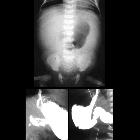esophageal web
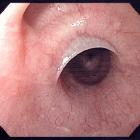


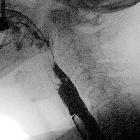

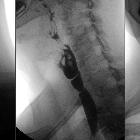
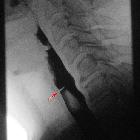









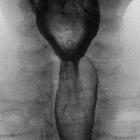



Esophageal webs refer to an esophageal constriction caused by a thin mucosal membrane projecting into the lumen.
Epidemiology
Esophageal webs tend to affect middle-aged females.
Clinical presentation
Patients are usually asymptomatic and the finding may be incidental and unimportant. However, if the stenosis is severe symptoms include dysphagia and regurgitation of food.
Pathology
Location
More commonly occur in the cervical esophagus near cricopharyngeus muscle than in the thoracic esophagus. They typically arise from the anterior wall and never from the posterior wall; they can also be circumferential . Occasionally, multiple webs are visualized during maximal distension.
Associations
- Plummer-Vinson syndrome
- GvHD
- GERD (especially a distal esophagus web)
- external beam radiation
Radiographic appearance
Fluoroscopy: barium swallow
- may be demonstrated on high-volume barium oesophagrams when the esophagus is fully distended
- a "jet effect" of contrast passing distal to the web may be seen
Treatment and prognosis
An esophageal web may indicate an esophagus at higher risk of upper esophageal and hypopharyngeal carcinoma.
Treatment options include:
- balloon dilatation
- bougienage during endoscopy
Differential diagnosis
- submucosal venous plexus: normal structure, noted anteriorly only as slightly irregular mucosa
- Schatzki ring: occurs in the distal esophagus
Siehe auch:
- zervikales Ösophagusweb
- duodenales Web
- Plummer-Vinson-Syndrom
- Jet-Phänomen bei ösophagealen Web-Stenosen
- retrocricoidale Schleimhautfalten
- esophageal constriction
und weiter:

 Assoziationen und Differentialdiagnosen zu Membranstenose Ösophagus:
Assoziationen und Differentialdiagnosen zu Membranstenose Ösophagus:
